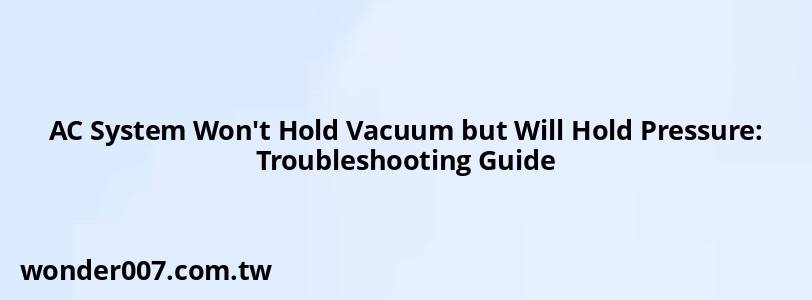AC System Won't Hold Vacuum but Will Hold Pressure: Troubleshooting Guide

An AC system that holds pressure but fails to maintain a vacuum indicates a specific type of leak or issue within the system. Understanding this phenomenon is crucial for effective troubleshooting and repair.
Understanding the Issue
When an AC system holds pressure but won't hold a vacuum, it suggests that there may be a leak that only manifests under vacuum conditions. This can occur due to various factors, including the type of seals used, the condition of components, or even the presence of moisture in the system.
Key Points to Consider:- Vacuum vs. Pressure: A vacuum creates a different pressure environment than when the system is pressurized. Some leaks may only become apparent under vacuum due to the way seals or components react to differing pressures.
- Common Causes: Issues may arise from faulty Schrader valves, worn seals, or connections that are not airtight. In some cases, internal components like the compressor shaft seal can also be problematic.
Troubleshooting Steps
To effectively address the problem of an AC system that won't hold a vacuum but does hold pressure, follow these steps:
- Inspect Connections: Check all fittings, hoses, and connections for tightness and integrity. Loose connections can lead to significant leaks under vacuum.
- Check Schrader Valves: Ensure that Schrader valves are functioning correctly. These valves can leak under vacuum conditions if they are damaged or improperly seated.
- Test with Soapy Water: Apply soapy water to suspected areas. Bubbles will form at any leak points when under vacuum pressure.
- Use UV Dye: If you suspect leaks in hard-to-reach areas, consider adding UV dye to the system and using a UV light to detect leaks after pressurizing the system.
- Replace Worn Components: If any seals or gaskets appear worn or damaged, replace them. This includes O-rings and seals around fittings and components.
Important Considerations
- Moisture in System: If moisture has entered the AC system, it can cause issues during vacuuming. Ensure that the system is properly evacuated and dried before recharging.
- Compressor Issues: A faulty compressor can sometimes hold pressure but fail to maintain a vacuum. Inspect the compressor for signs of wear or damage.
- Gauge Calibration: Ensure that your gauges are calibrated correctly. Faulty gauges may provide misleading readings during testing.
FAQs About AC Systems
FAQs About AC System Vacuum Issues
- Why does my AC system hold pressure but not vacuum?
This typically indicates a leak that only manifests under vacuum conditions, often related to seals or Schrader valves. - How can I find a leak in my AC system?
Use soapy water on connections and fittings, or add UV dye to help identify leaks after pressurizing the system. - What should I do if I suspect moisture in my AC system?
Evacuate the system thoroughly before recharging it to remove any moisture.
By following these troubleshooting steps and considerations, you can effectively diagnose and resolve issues with your AC system that holds pressure but fails to maintain a vacuum.
Related Posts
-
How to Fix EPC Light on Audi Q5: Expert Guide
26-01-2025 • 219 views -
2022 Hyundai Santa Fe Floor Mats: Ultimate Guide
28-01-2025 • 187 views -
Ram 1500 Rear View Mirror Removal: Step-by-Step Guide
27-01-2025 • 331 views -
Ford 4.0 SOHC Timing Chain System: Comprehensive Guide
29-01-2025 • 309 views -
Ford Fusion Radio Not Working: Troubleshooting Guide
27-01-2025 • 339 views
Latest Posts
-
Power Steering Fluid Leak On Passenger Side
01-02-2025 • 545 views -
2015 Chevy Traverse AC Recharge Port Location
01-02-2025 • 497 views -
Rear Brake Caliper Piston Won't Compress
01-02-2025 • 431 views -
How To Turn Off Paddle Shifters Mercedes
01-02-2025 • 472 views -
Are O2 Sensors Covered Under Warranty
01-02-2025 • 454 views
Popular Posts
-
V12 Engine Costs: What You Need to Know
26-01-2025 • 785 views -
BMW X5: Fuel Tank Capacity and Specifications
28-01-2025 • 739 views -
EPC Light: Understanding Causes and Solutions
26-01-2025 • 1156 views -
Toyota Hiace: Fuel Efficiency Insights for 2025
26-01-2025 • 813 views -
Hino Warning Lights: Understanding Dashboard Alerts
26-01-2025 • 965 views
